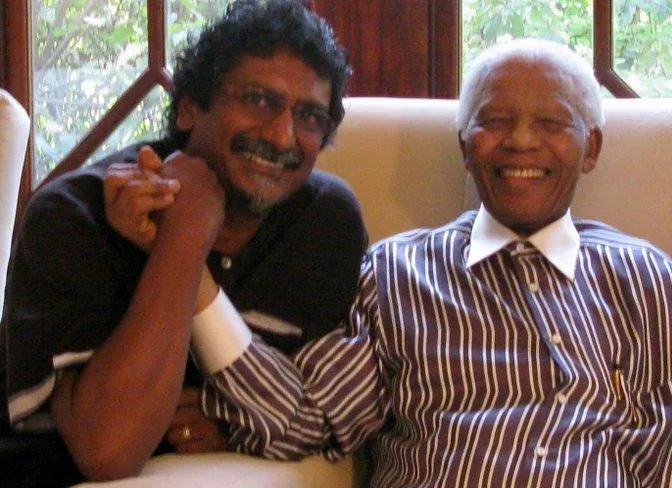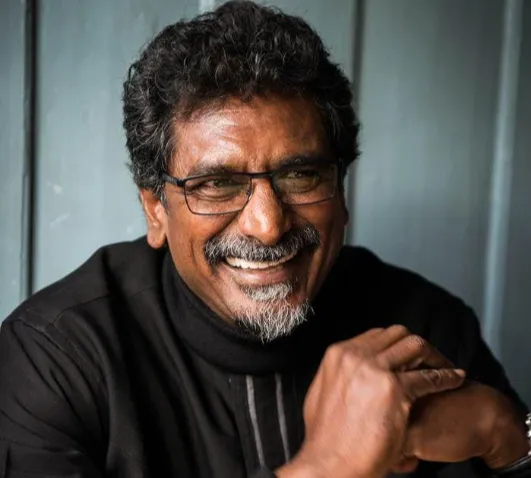
Jay Naidoo with Nelson Mandela
Image: X
“THE time for the healing of the wounds has come. The moment to bridge the chasms that divide us has come. The time to build is upon us. We have, at last, achieved our political emancipation. We pledge ourselves to liberate all our people from the continuing bondage of poverty, deprivation, suffering, gender and other discrimination.” - Nelson Mandela’s, inaugural address, May 10, 1994.
THIS April 27, 2025, we celebrated 31 years of freedom. Freedom month stirs something deep in me. I remember the songs of resistance echoing through the townships, the fierce courage of workers striking for dignity, and the burning hope in the eyes of young activists demanding a future beyond the shadows of apartheid. We were not just fighting against a system - we were fighting for the soul of our nation. Our struggle was guided by the spirit of servant leadership, compassion and solidarity.
April 27, 1994, was a sacred day. I stood among my comrades, many of whom had been tortured, exiled, or imprisoned, and watched our people cast their votes - many for the first time. It was a moment of collective rebirth. But it was never the end. It was only the beginning. For all of us, it was the first time we voted in our lives.
Today, we see nearly half of the population not exercising their right to vote. The reality is that we are still deeply divided. Not just by race but by class, status, employment, religion, gender, poverty and suffering.
The syndrome of the “Big Chief,” and party bosses who know what is best for the people, have failed us. The toxic masculinity of politics today deepens divisions, using the legitimate grievances of our people to drive personal political agendas. Ascendency to power does not change the basic fundamentals of deprivation and suffering. It just opens the doors to a new brigade of wannabes to feed at the trough.
The state has become the site of contestation. Not about the delivery of the better life we promised our people. But a fierce war within the political class rearranging their chairs on the Titanic. Our political and moral crisis is dominated by “dirty money” in which decisions are driven by the emissaries of billionaires, both locally and globally.
It is that system itself that needs to be challenged, not the individual decisions it makes. For 31 years, citizens have surrendered their power to these leaders. Now we need to reclaim our power.
Freedom is not just about voting. It is about voice. About food on the table, land to work, education that liberates, healthcare that heals, and safety for our children. And in that sense, we must be honest - many of the promises we made in 1994 remain unfulfilled.
For me, Freedom Month is not about fanfare or flag-waving. It is a sacred time of remembrance and reckoning. We must remember the lives lost, the sacrifices made, and the dreams we once held together. But more than that - we must reckon with how far we have drifted from the path of justice.
We need to return to the values that guided our struggle: Ubuntu, humility, service, solidarity and truth. We must build a society that heals the wounds of the past and nurtures the potential of every child - not just those born into privilege.
I speak now not as a former leader, but as an elder in the struggle for human dignity.
To the youth: do not inherit silence. Reclaim your voice. Organise. Dream wildly. Demand more. We did not fight so that you would become spectators of democracy. We fought so that you could shape it. This Freedom Month, let us rekindle the flame of collective hope. Let us remember that freedom is not a gift from the powerful. It is a responsibility we carry - every day, in every act of courage, compassion, and truth-telling.
Let us honour the past not with nostalgia, but with action. Because only then will our freedom be real.
My last 31 years have convinced me that changing the system is not rocket science. The biggest challenge we face is changing the human being. On this Freedom Day, I asked myself what more I can do to find that “Madiba” within. That is the choice for every citizen. To make ourselves better human beings. To reach out across the chasm in small ways with kindness. And those millions of small actions will achieve more than grandiose promises.
I am an elder today. I have no ambition to seek position or power. I strive in everything I do to unify the differences and to support an authentic intergenerational dialogue. To listen carefully to the voices of young people. To encourage and nurture their agency.
We all share a wound of our past. Whether that manifests in the violence of superiority or the resentment of a feeling of inferiority, it is a wound to be healed. If Mandela and many of his generation made such tremendous sacrifices to bring us to this point, then who am I not to continue to be of selfless service to others? Why
should I not find that courage to take that journey from my head to my heart and heal myself? And reach out to others as we walk a path guided by ancestral wisdom to rise above our differences. To redefine civilisation beyond our addictive consumption and material accumulation. To see mother earth as a co-creator, teacher and symbiotic partner.
Let us ask ourselves how the seeds we plant today will yield a harvest of hope and joy 31 years from now. It is time to plan, today, so that our children and grandchildren have a happy, healthy and peaceful tomorrow.
This is my prayer. As Tata Mandela once said wisely: “It always seems impossible until it is done.”

Jay Naidoo
Image: Supplied
Jay Naidoo was a South African political and social activist, who served as the founding general secretary of the Congress of South African Trade Unions from 1985 to 1993. He then served as minister responsible for the Reconstruction and Development Programme in the first post-apartheid cabinet; and then communications. He is an elder today, who remains committed to dream of freedom birthed in 1994.
** The views expressed do not necessarily reflect the views of IOL or Independent Media.